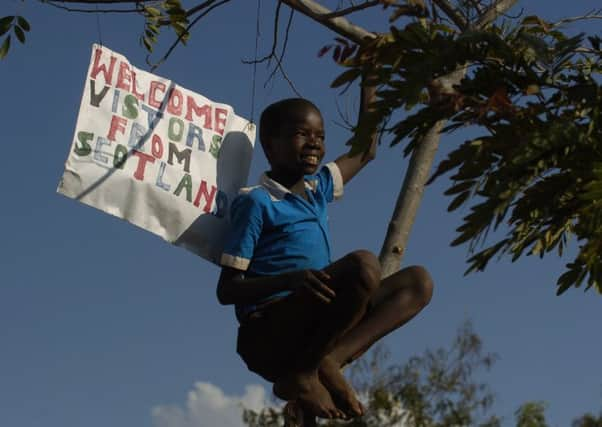Andrew Namakhoma: Malawi and Scots prove partnerships score goals


Last October I visited Scotland for the second time, the first since being elected chair of the Malawi Scotland Partnership, the Malawian network co-ordinating and supporting our nation’s many civic links with Scotland (of which Malawi is rightly proud). I was full of expectations and eager to learn and interact with my friends and colleagues in Scotland.
I arrived and went straight into a planning meeting in which I was asked if I would help make a promotional video the next day by undertaking a “dizzy goal”. The idea was simple I was told: spin around with your forehead on a football 13 times and then try to score a penalty. We would do it as a Scotland vs Malawi penalty shoot out, with me competing against David Hope-Jones, the principal officer of our sister organisation in Scotland. I agreed, and the next day I strode out with all confidence on to the pitch with David. Little did we know what was facing us. Suffice to say we both failed to score and ended up on the floor in fits of laughter. Malawi 0, Scotland 0.
Advertisement
Hide AdAdvertisement
Hide AdThe idea behind our “dizzy goal” video (which, embarrassingly, is still on YouTube!) was to raise awareness of the UN’s Sustainable Development Goals, or now simply the “Global Goals”. Agreed in September 2015 after years of consultation, and formally under way since the start of 2016, these 17 goals set out how every country in the world will come together to end poverty, combat climate change and fight injustice and inequality.
Crucially, these aren’t just goals for the poorer countries of the world like Malawi, they are universal. Every nation, rich and poor, is responsible for delivery in their own country.
The Global Goals cannot succeed if driven by governments alone. Delivery, ownership and accountability needs to be top-down and bottom-up. We need our governments to work in partnership with all sections of civic society, as well as the private sector.
The very last of the 17 Goals calls for “a new global partnership”. But the UN makes clear this is more than simply one of the 17; this is the core principle through which all the goals will be delivered. Not through charity but through partnership. And this is where Scotland and Malawi have a powerful story to share, with 150 years of dignified two-way people-to-people and community-to-community partnership dating back to Dr Livingstone.
Each year, more than 94,00 Scots and 198,000 Malawians work in partnership.
Both sides contribute and both sides benefit from these many links. According to the University of Edinburgh, an estimated two million Malawians directly benefit but so too do more than 300,000 Scots.
Most partnerships between our two nations receive no funding. They are churches, schools, businesses, hospitals, universities and community groups choosing to work together in friendship and solidarity.
Sadly, Malawi currently faces a number of serious issues. Climate change means the rains come later and are less reliable, this is resulting in food insecurity today across many parts of my country.
Advertisement
Hide AdAdvertisement
Hide AdThe economy is struggling, with inflation rising and the value of our kwacha dropping. And too many Malawians lack access to clean water, quality education and good healthcare.
These are significant challenges but they are not insurmountable. The Global Goals offer hope for a better future, in every country.
In Malawi we stand ready to embrace the goals, in part through our continuing long-standing friendship with the people of Scotland. To do this we must first raise awareness of the Global Goals across all sections of society in Malawi and Scotland, and find innovative ways of connecting government with civic society, academia and business.
My small part in this global effort began by spinning round a football 13 times in Edinburgh. Both Scotland and Malawi may have failed to score that day but, by working together through partnership, I am sure our two nations can succeed with the Global Goals.
For there is a saying in Malawi: if you want to go fast, go by yourself; if you want to go far, go with a friend. Just don’t get too dizzy!
• Andrew Namakhoma lives in Lilongwe and travels across Malawi as the community development programmes officer for Malawi’s National Association for Small-Holder Farmers. Last year he was elected chairman of the Malawi Scotland Partnership.